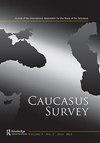The Georgian Legion of World War I
IF 0.5
Q3 AREA STUDIES
引用次数: 0
Abstract
ABSTRACT The Georgian Legion of World War I represented one of the most peculiar and informative implementations of Germany’s grand scheme to win the war by revolution and, eventually, to replace enemy imperial rule. While the topic is only scarcely known in research, abundant sources exist to tell the unfortunate story of hundreds of refugees turned into soldiers by Georgian nationalists and German officers. The endeavour was later assessed as widely unsuccessful by its participants and by historians, but its true value can only be uncovered by embedding the legion into its wider context, as an integral component of Germany’s “programme for revolution”, as well as by drawing parallels to similar undertakings. This article furthermore aims to discuss the origins of the idea for the initiative and to draw conclusions about its seeming failure, while providing an alternative perspective on the project. By discussing its implementation and motives, the analysis of the legion can deliver insight on the underlying motives of German wartime foreign policy and on the collaboration of nationalist actors as agents of German imperialism, while being simultaneous promoters of their genuine revolutionary cause.一战时期的格鲁吉亚军团
第一次世界大战的格鲁吉亚军团代表了德国通过革命赢得战争并最终取代敌人帝国统治的宏伟计划中最独特和最翔实的实现之一。虽然这个话题在研究中很少为人所知,但大量的资料讲述了数百名难民被格鲁吉亚民族主义者和德国军官变成士兵的不幸故事。这项努力后来被参与者和历史学家普遍认为是不成功的,但它的真正价值只有通过将军团作为德国“革命纲领”的一个组成部分,以及与类似事业的相似之处,才能被揭示出来。本文进一步旨在讨论该倡议的起源,并得出其看似失败的结论,同时提供了对该项目的另一种看法。通过讨论其实施和动机,对军团的分析可以洞察德国战时外交政策的潜在动机,以及作为德国帝国主义代理人的民族主义行动者的合作,同时也是他们真正革命事业的推动者。
本文章由计算机程序翻译,如有差异,请以英文原文为准。
求助全文
约1分钟内获得全文
求助全文
来源期刊

Caucasus Survey
Arts and Humanities-History
CiteScore
1.30
自引率
9.10%
发文量
4
期刊介绍:
Caucasus Survey is a new peer-reviewed, multidisciplinary and independent journal, concerned with the study of the Caucasus – the independent republics of Armenia, Azerbaijan and Georgia, de facto entities in the area and the North Caucasian republics and regions of the Russian Federation. Also covered are issues relating to the Republic of Kalmykia, Crimea, the Cossacks, Nogays, and Caucasian diasporas. Caucasus Survey aims to advance an area studies tradition in the humanities and social sciences about and from the Caucasus, connecting this tradition with core disciplinary concerns in the fields of history, political science, sociology, anthropology, cultural and religious studies, economics, political geography and demography, security, war and peace studies, and social psychology. Research enhancing understanding of the region’s conflicts and relations between the Russian Federation and the Caucasus, internationally and domestically with regard to the North Caucasus, features high in our concerns.
 求助内容:
求助内容: 应助结果提醒方式:
应助结果提醒方式:


